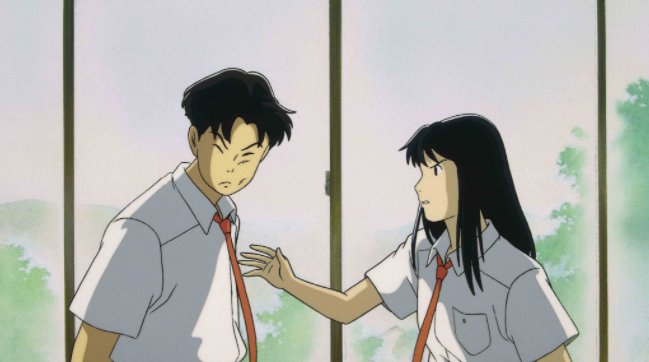The Japanese, already a naturally sexually repressed nation, take said physical restraint to a new level when placed within the high school context of Tomomi Mochizuki’s 1993 film, Ocean Waves (otherwise known as I Can Hear the Sea). Told from the position of hindsight, the film opens with our protagonist, Taku Morisaki (voiced by Nobuo Tobita), waiting on a train platform in Tokyo as he catches a glimpse of a girl he knew in high school, Rikako Muto (voiced by Yōko Sakamoto).
Taku then begins to explain how it all began, setting the stage for missed opportunity and quelled emotions. With the original stage set in Kōchi, a remote city on the island of Shikoku, Ocean Waves focuses on the friendship that forms between Taku and Yutaka Matsuno (voiced by Toshihiko Seki) after they turn out to be the only two high school students willing to protest the merging of the class trip with the junior high kids to Hawaii in response to their collective disappointing grades. As the only people who raise their hands at the assembly in protest, demanding further explanation, they’re told to go to a specific classroom after school where they’ll be given greater detail about the trip’s shift in nature. Instead, when they arrive separately at the classroom, the chalkboard instructs them to write their grievances on a piece of paper.
Disappointed but with no other means to express their discontent, both Taku and Yutaka write what they feel, the latter insisting, “Even 10, 20 years from now, I will not agree with the school’s decision.” Impressed with his foresight into the future, Taku instantly sees a soulful kindred in Yutaka. But the appearance of Rikako late in the year forms a gradually developing rift between them, as Yutaka almost instantaneously takes a shine to the Tokyo transfer. Taku, however, doesn’t feel that Rikako is worthy of his love, that she won’t appreciate him because, as he says, “Girls only care about how they look.”
But an about-face in the dynamic occurs while on their Hawaii trip, when Rikako asks Taku to borrow money because she lost hers and doesn’t have any traveler’s checks. Playfully chastising him for being a “goody-goody” because he gives her flak for bringing cash instead of checks, she also critiques him for his “samurai” accent. It is within this moment that their attraction is born, the subtext of teasing being, obviously, that they like one another. Taku bristles the second Yutaka approaches him after this exchange–feeling somehow guilty–and explains that she simply wanted to borrow money.
However, it’s apparent that Yutaka can sense the chemistry between Taku and Rikako, choosing to ignore it until after he learns the two have taken a trip to Tokyo together at Rikako’s insistence of seeking out her father so that she might go to live with him again. Every scene an explosive buildup to a denouement of physical violence, the eventual full-circle structure of the plot leads us to learn the ultimate truth about the rapport between Taku and Rikako, two seemingly star-crossed lovers of the Japanese animated world.





















